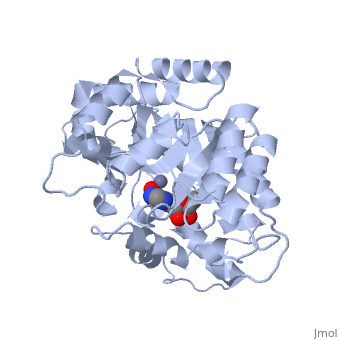2ada
ATOMIC STRUCTURE OF ADENOSINE DEAMINASE COMPLEXED WITH A TRANSITION-STATE ANALOG: UNDERSTANDING CATALYSIS AND IMMUNODEFICIENCY MUTATIONSATOMIC STRUCTURE OF ADENOSINE DEAMINASE COMPLEXED WITH A TRANSITION-STATE ANALOG: UNDERSTANDING CATALYSIS AND IMMUNODEFICIENCY MUTATIONS
Structural highlights
Function[ADA_MOUSE] Catalyzes the hydrolytic deamination of adenosine and 2-deoxyadenosine. Plays an important role in purine metabolism and in adenosine homeostasis. Modulates signaling by extracellular adenosine, and so contributes indirectly to cellular signaling events. Acts as a positive regulator of T-cell coactivation, by binding DPP4. Its interaction with DPP4 regulates lymphocyte-epithelial cell adhesion (By similarity). Evolutionary ConservationCheck, as determined by ConSurfDB. You may read the explanation of the method and the full data available from ConSurf. Publication Abstract from PubMedThe crystal structure of a murine adenosine deaminase complexed with 6-hydroxyl-1,6-dihydropurine ribonucleoside, a nearly ideal transition-state analog, has been determined and refined at 2.4 angstrom resolution. The structure is folded as an eight-stranded parallel alpha/beta barrel with a deep pocket at the beta-barrel COOH-terminal end wherein the inhibitor and a zinc are bound and completely sequestered. The presence of the zinc cofactor and the precise structure of the bound analog were not previously known. The 6R isomer of the analog is very tightly held in place by the coordination of the 6-hydroxyl to the zinc and the formation of nine hydrogen bonds. On the basis of the structure of the complex a stereoselective addition-elimination or SN2 mechanism of the enzyme is proposed with the zinc atom and the Glu and Asp residues playing key roles. A molecular explanation of a hereditary disease caused by several point mutations of an enzyme is also presented. Atomic structure of adenosine deaminase complexed with a transition-state analog: understanding catalysis and immunodeficiency mutations.,Wilson DK, Rudolph FB, Quiocho FA Science. 1991 May 31;252(5010):1278-84. PMID:1925539[1] From MEDLINE®/PubMed®, a database of the U.S. National Library of Medicine. See AlsoReferences |
| ||||||||||||||||||
